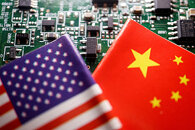- Joined
- Aug 19, 2017
- Messages
- 2,999 (1.06/day)
The US Trade Representative (USTR) under Biden administration is preparing to reinstate tariffs on certain technology products imported from China, including GPUs and motherboards. The 25% duties, initially imposed by the Trump administration in 2019 but later suspended, are being revived as part of broader efforts to address concerns over China's economic and trade practices. The tariffs are intended to protect American companies from what the administration describes as unfair Chinese trade actions like intellectual property theft and forced technology transfers that undermine U.S. competitiveness. While no specific effective date was provided, the reinstated tariffs are expected to impact major Chinese computing component suppliers significantly. The revival of the Trump-era tariffs marks a reversal from the previous administration's move to temporarily suspend the duties in 2020 as a goodwill gesture during broader trade negotiations with Beijing.
However, those talks ultimately stalled amid the COVID-19 pandemic and rising bilateral tensions over economic and national security issues. Industry groups have expressed concerns that reviving the tariffs could disrupt tech supply chains, increase costs for U.S. companies and consumers, and potentially invite further Chinese retaliation. The tariffs would apply to GPUs, motherboards and other computing components assembled in China regardless of whether the raw components themselves originated from the country. With tensions already elevated over issues like Taiwan and advanced semiconductor production, the tariff announcement could set the stage for further economic friction between the world's two largest economies absent a negotiated resolution on tech trade.

View at TechPowerUp Main Site | Source
However, those talks ultimately stalled amid the COVID-19 pandemic and rising bilateral tensions over economic and national security issues. Industry groups have expressed concerns that reviving the tariffs could disrupt tech supply chains, increase costs for U.S. companies and consumers, and potentially invite further Chinese retaliation. The tariffs would apply to GPUs, motherboards and other computing components assembled in China regardless of whether the raw components themselves originated from the country. With tensions already elevated over issues like Taiwan and advanced semiconductor production, the tariff announcement could set the stage for further economic friction between the world's two largest economies absent a negotiated resolution on tech trade.

View at TechPowerUp Main Site | Source







